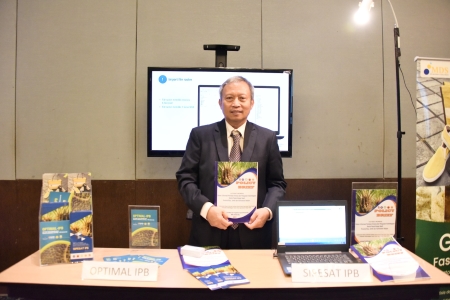IPB University Launches SIPESAT, Information System for Performance Assessment and Institutional Strengthening of Palm Oil Supply Chain

The collaboration between IPB University and the Palm Oil Plantation Fund Management Agency (BPDPKS) again presents the results of its research to the community. One of them is SIPESAT IPB, an information system that is useful for performance assessment and institutional strengthening of the oil palm supply chain of independent smallholders. The launching of SIPESAT IPB was carried out at the Launching of IPB's Excellent Research Results: Sawit 4.0 held by the Directorate of Research and Innovation at the IPB International Convention Centre, Bogor (27/6).
Involved in the study and development of this system are Prof Marimin as chairman, Prof Machfud, Prof Taufik Djatna, Dr Sapta Raharja, Dr Dadang Kurnia as members. The study also involved researchers from other universities including Prof Hesty Heryani (Lambung Mangkurat University), Prof Fitra Lestari (Riau State Islamic University), Prof Dompak Napitupulu and Dr Ernawati Hamid (Jambi University) and assisted by research assistants and technicians.
"Palm oil is the main and leading commodity that contributes significantly to the gross domestic product (GDP). The palm oil business involves millions of farmers, traders and industries in producing products that are useful for society. The palm oil commodity also has a positive impact on the economy of the Indonesian people," said Prof Marimin as team leader.
However, he continued, despite the various advantages of the palm oil commodity, the sector also has several weaknesses that need to be resolved immediately. Looking at the various complexities of problems in the palm oil agro-industry supply chain, in this study Prof Marimin and his team proposed two main issues that must be resolved, namely the performance of the supply chain and palm oil institutions through the support of information systems.
"Independent smallholders as the most upstream actors in the palm oil supply chain need support to produce palm oil commodities in accordance with the quality desired by the industry. Cooperatives and farmer group associations also need support, training and direction in business development to improve the welfare of their members. The palm oil industry also needs a supply of raw materials that are of the right quality, right quantity and right on time," he said.
Prof Marimin explained that along with the development of digital technology and industry 4.0, supply chain performance and institutions need to be implemented in an adaptive system that is able to reach all actors in the supply chain. This information system is intended so that activities and transactions along the palm oil agro-industry supply chain can be monitored and detected if there are issues that must be resolved immediately.
"The digitalisation of processes and transactions in the palm oil agro-industry can support the welfare of actors, increase efficiency and effectiveness along the supply chain. This information system also has analytical data capabilities in detecting low supply chain performance and offers convenience in documenting transaction data along the palm oil supply chain," he explained.
Prof Marimin added that SIPESAT IPB was developed with the aim that actors can conduct self-assessment in supply chain performance assessment. The ability to self-assess performance positions using the Supply Chain Operation Reference (SCOR) technique for each actor is based on every transaction that has been carried out along the supply chain. This is to facilitate performance monitoring.
In addition, the system not only provides information on current performance based on the results of data analysis, but also provides recommendations in order to improve performance and strengthen supply chain institutions.
"The system developed is tightly coupled that supports government regulations (minister of agriculture regulations/governor regulations), encourages trade system efficiency, supports the acceleration of cultivation certification, and supports the stability of the selling price of fresh fruit bunches (FFB) from independent farmers, where the actors in it are strongly bound to one another," he said.
Prof Marimin continued, the performance assessment information system is also equipped with a FFB traceability feature. The presence of this feature can ensure that Indonesian palm oil is cultivated in legal plantations.
To date, SIPESAT IPB has been tested in oil palm production centres in Riau Province, Jambi Province and South Kalimantan Province. The system can help palm oil supply chain actors in Indonesia in improving performance and strengthening palm oil institutions.
"This information system still has the opportunity to be developed based on the needs of users in the field and support supply chain efficiency. Some of the potentials for further development are geographic-based performance assessment and a real time traceability system equipped with blockchain-based digital contracts," Prof Marimin said.
He hopes that with these developments, farmers and other actors in the supply chain can monitor the development of supply chain performance in real time and business relations of FFB suppliers to palm oil mills with smart contracts. (*/Rz) (IAAS/RUM)



